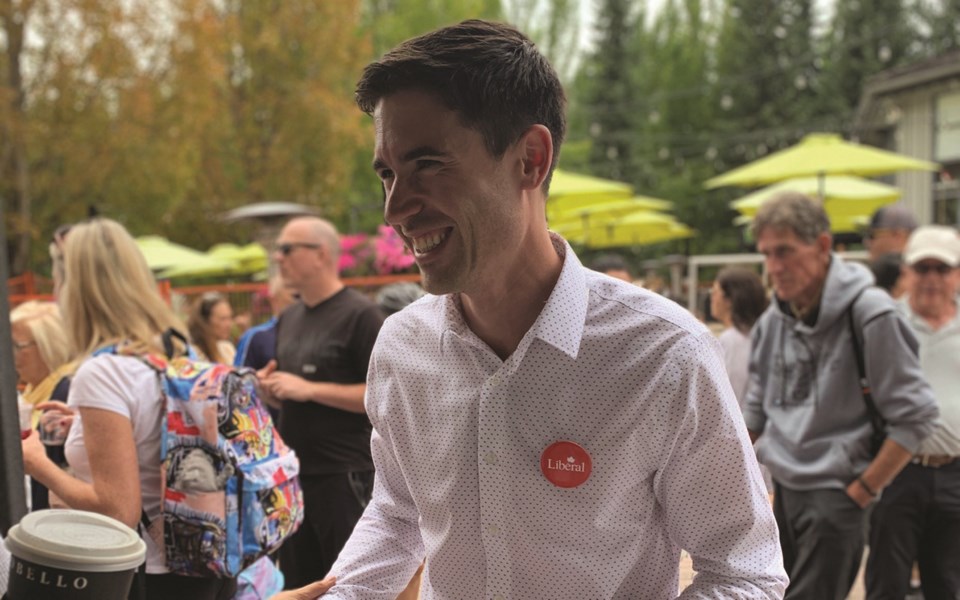Whistler MP Patrick Weiler describes the feds’ Oct. 13 housing funding announcement as a “long time coming” for the community.
“We were able to do this announcement, which was very exciting especially in this environment right now, when interest rates are where they are,” he said.
The announcement, made in front of the freshly-minted housing complex at 1315 Cloudburst Drive in Cheakamus Crossing, was to talk up the $89.5 million in federal financing committed to 238 units across the riding, including 106 in Whistler. The funds come in the form of fully repayable low-interest loans from the Canada Mortgage and Housing Authority.
Weiler said federal government support for projects led by local governments and organizations was critical to ensure those projects were able to go ahead.
“Without that, we would not be able to provide housing for the workforce in Whistler, which would be fatal for businesses that need to operate, but also for the community,” he said.
The $89.5 million is divided between four projects: two in Whistler, one in Squamish and one on Bowen Island, with $30 million being plowed into Whistler projects. The aforementioned 1315 Cloudburst Drive development by Whistler Sport Legacies is completed and occupied, while the Whistler Housing Authority (WHA) is currently working on the 1450 Mount Fee Road development, slated to be housing workers by late 2024.
The 106 new units supported by federal funding will help, but there’s more to be done, said Weiler.
“We’re going to need to continue to build housing,” he said. “Whistler grew by 20 per cent in the past five years, and it’s a very desirable place to be, so we’re going to continue to need to work closely with the RMOW and the WHA and others to make sure we’re able to get that housing built.”
Among other items on the housing ticket, the federal government is currently debating Bill C-56 (referred to as the Affordable Housing and Groceries Act), which according to federal finance minister Chrystia Freeland, is intended to get more rental homes built faster, by removing GST for the construction of new purpose-built rental housing. The legislation was introduced in Ottawa in late September and is currently in second reading.
Weiler, who sits on the parliamentary finance committee, said C-56 would make a “huge difference in ensuring we have more of those rental projects built, which is one of the largest gaps and needs that we have in Canada as a whole.”
Weiler said he wanted to address purpose-built rental projects already underway and their eligibility to have GST waived as part of the bill’s review, highlighting the recent projects in Cheakamus that are either already underway or completed.
“It’s projects like these that are so critical,” said Weiler, who lauded the value of working with local governments and groups like the WHA and Whistler Sport Legacies.
“They’ve stepped up to ensure that critical housing gets built … which we very much need so we have the services we need in the community we live in.”
B.C. makes the right move on short-term rentals, says Weiler
On the provincial front, Weiler said he and the federal government welcomed British Columbia’s new legislation on short-term rentals (STR) as another tool to increase the supply of affordable, long-term housing.
The legislation is designed to push STR stock into the long-term market by introducing a requirement that operators only rent out rooms in the home they live in, along with greater powers for local governments to enforce against bad actors, and more strenuous reporting requirements at the provincial level.
“From the numbers I’ve seen across B.C., it could be up to 8,000 homes that could be made available,” said Weiler. “I’ve seen this in other areas of the riding, particularly on the Sunshine Coast where they’ve moved ahead with similar bylaws locally, and the effect has been a lot of those units have gone into the long-term rental market.”
Weiler added local context must be considered as well, noting Whistler is a tourism-based community and economy, and has zones intended for STRs.
“It’s important that [the new laws] dovetail with local zoning.”
Whistler is one of 14 municipalities across B.C. exempt from the requirement STR operators live in the property they rent rooms out of.




